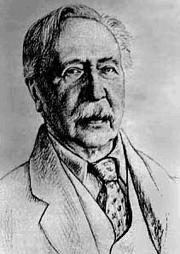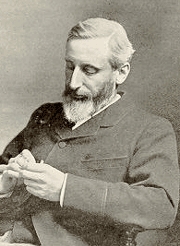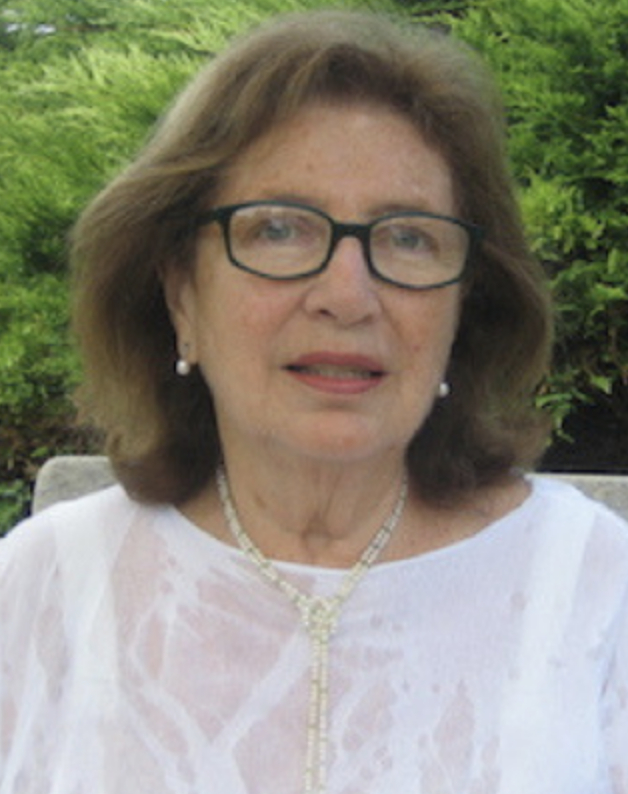February 24
George Augustus Moore

On this date in 1852, novelist George Augustus Moore was born into a Catholic family in Ballyglass, County Mayo, Ireland. He was educated at a Catholic college but jettisoned his faith in Paris, where he went at 18 to study art, as described in Flowers of Passion (1877). His 1883 novel A Modern Lover was barred by some libraries. In The Apostle, he depicted Paul murdering Jesus after finding him alive many years after his alleged “resurrection.”
Esther Waters (1894) is about a nun who gives birth to a son. In Brook Kerith (1916), what freethought historian Joseph McCabe called “his beautiful rationalized version of the life of Christ,” Moore described Jesus as an Essenian monk, for which the Catholic Church attempted to prosecute him. In 1903, after a disagreement with his brother Maurice over the religious upbringing of his nephews, Moore declared himself to be Protestant. His conversion was announced in a letter to the Irish Times newspaper, according to biographer Adrian Frazier in George Moore, 1852-1933 (2000).
His last novel, Aphrodite in Aulis, was published in 1930. His autobiography Hail and Farewell was published in three volumes, 1911-14. Moore’s nonfiction includes Reminiscences of the Impressionist Painters (1906). His Collected Works (1924) has 21 volumes. D. 1933.
“The mind petrifies if a circle be drawn around it, and it can hardly be denied that dogma draws a circle round the mind.”
— Moore, "Salve," the second volume of his "Hail and Farewell" trilogy (1912)
Grant Allen

On this date in 1848, author Charles Grant Blairfindie Allen was born near Kingston, Ontario, Canada. His father was a Protestant minister. Allen studied at the College Imperial of Dieppe, the King Edward’s School of Birmingham and Oxford University. He taught at a college for Blacks at Spanish Town, Jamaica, for four years, where his agnostic and other progressive views matured.
He returned to England and began writing books. His well-regarded Physiological Aesthetics (1877) was dedicated to Herbert Spencer. Other books include Vignettes from Nature (1881), The Evolutionist at Large (1881), The Colours of Flowers (1882) and The Evolution of the Idea of God (1897). The Hand of God, a collection of essays, was published posthumously in 1909 by the Rationalist Press Association. The Evolution of the Idea of God offered a theory of religion comparable to Spencer’s “ghost theory.” The young G. K. Chesterton said of Allen’s book, “It would be much more interesting if God wrote a book on the evolution of the idea of Grant Allen.”
Allen married twice and had one son, Jerrard. He died of liver cancer at age 51 at his home in 1899.
“[T]he vast mass of existing gods or divine persons, when we come to analyze them, do actually turn out to be dead and deified human beings. … I believe that corpse worship is the protoplasm of religion.”
— Allen, quoted in "Who's Who in Hell," ed. Warren Allen Smith (2000)
Joan Konner

On this date in 1931, journalist Joan Barbara Konner was born in Paterson, N.J., the daughter of Martin Weiner, who was in the textile business, and the former Tillie Frankel, an artist. She received her B.A. from Sarah Lawrence College in 1951. She earned a master’s in jounalism from Columbia in 1961 when she was 30 after raising two daughters, Rosemary and Catherine. Her marriage ended in divorce, and Catherine died in 2003.
She was hired as a journalist for the Bergen Record, where she worked on the women’s page. She left in less than two years to work at WNBC-TV, where she was a writer and producer of many documentaries. She became executive producer of “Bill Moyers Journal” during the 1980s and later was president and executive producer of Moyers’ production company, Public Affairs Television. She helped produce the acclaimed six-part docuseries “Joseph Campbell and the Power of Myth” for Moyers. She worked with Alvin Perlmutter on the series and married him in 1994.
Konner ended her career in public television as executive producer for national news and public affairs for WNET/Thirteen in New York. She returned to Columbia in 1988 to become the first female dean of the Columbia School of Journalism. She was also publisher of the Columbia Journalism Review until 2000.
She wrote books on religion from the freethought point of view, such as The Atheist Bible: An Illustrious Collection of Irreverent Thoughts (2007), and You Don’t Have to Be a Buddhist to Know Nothing: An Illustrious Collection of Thoughts on Naught (2009) and is known for producing over 50 documentaries and television series that focus on ideas and beliefs. “I myself was born Jewish and I have great respect for that, but if you ask me to name what I’ve learned the most from — and what seems to guide my own behavior now — I say I’m a ‘Trans-Zen-Jewish-Quak-alist.’ ” (Read the Spirit interview, March 16, 2010.)
Konner won numerous awards and honors throughout her lengthy career, including 16 Emmys, a Peabody Award, the New Jersey Presswomen’s Lifetime Achievement Award and the New York Newswomen’s Award for Best Documentary. She died of leukemia at age 87 in Manhattan in 2018.
“I see myself as a journalist if anything. I don’t call myself an agnostic but I do recognize that I will never know.”
— Konner interview in the online magazine Read The Spirit (March 16, 2010)
